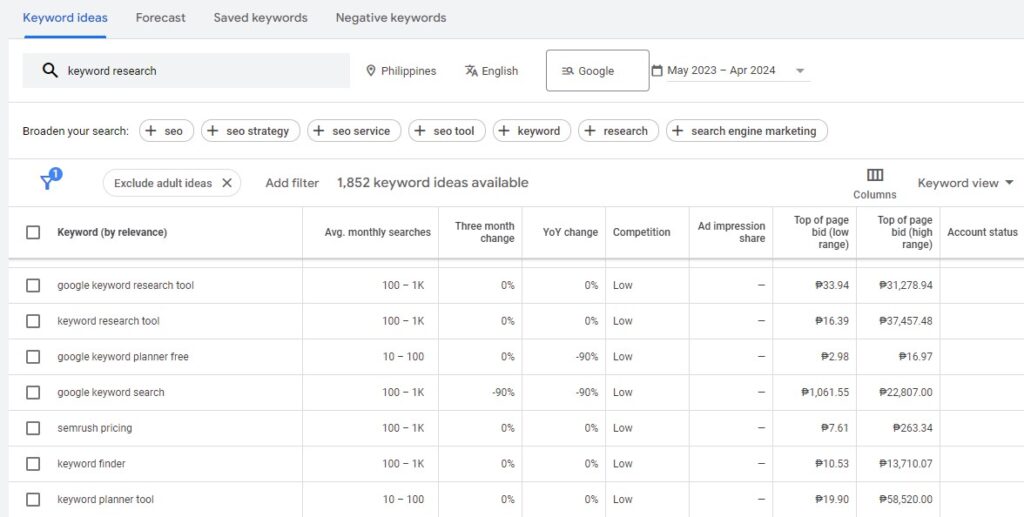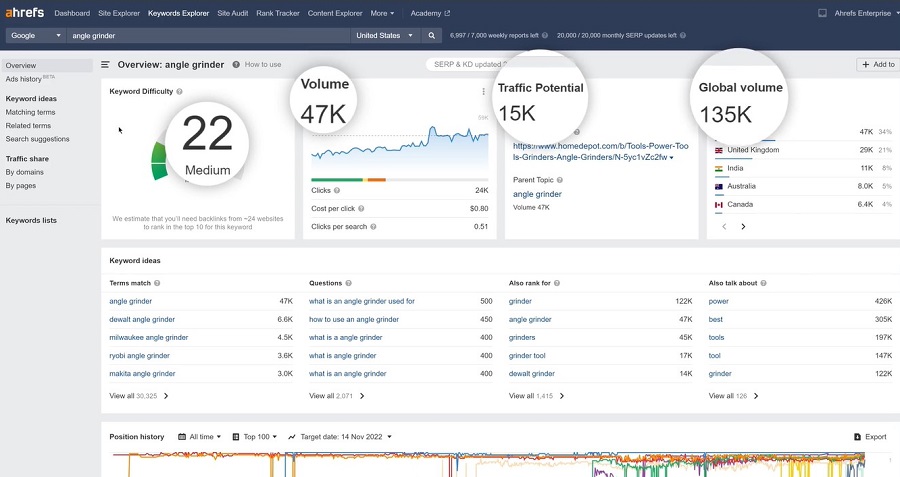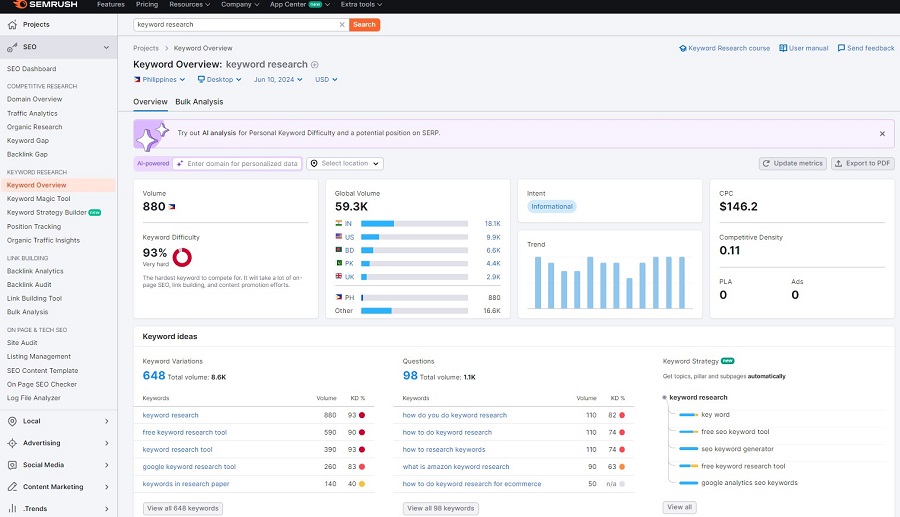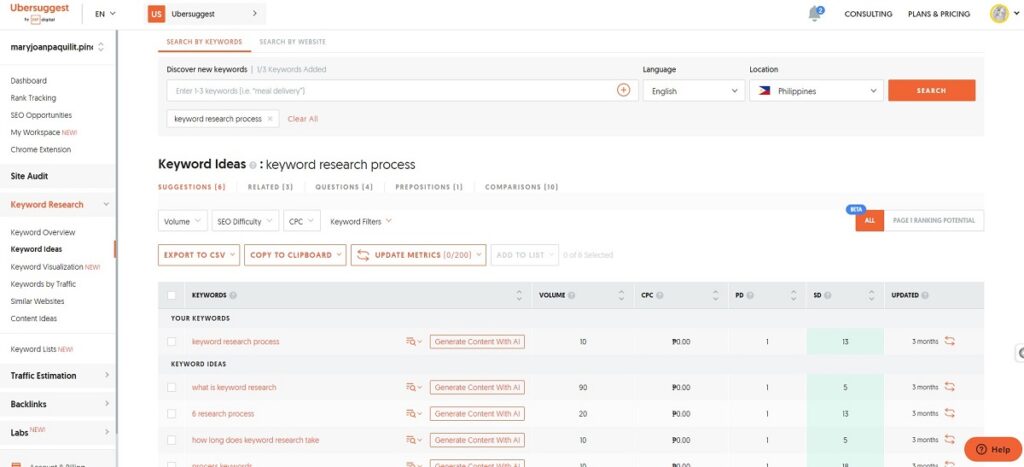Understanding the Basics: Keyword Research for Newbies
SEO Keyword Research & User Intent
Keyword research in SEO forms the bedrock of any successful digital marketing strategy. SEO, or Search Engine Optimization, involves enhancing a website to achieve higher rankings in search engine results. The ultimate goal is increased visibility, which translates to more traffic and potential conversions. Central to this process is understanding user intent. Knowing what users seek when they type certain keywords into search engines helps tailor content to meet their needs.
Types of User Intent:
- Informational Intent: Users seek information or answers to questions. This usually contains words such as How to, What is, Explanation, Meaning etc.
- Navigational Intent: Users look for a specific website or page. This is when a user types Amazon.com, Wikipedia.com or YouTube directly into search.
- Transactional Intent: Users are ready to purchase or perform an action which usually contains words such as Buy, Purchase, Best Price, For Sale during search.
- Commercial Investigation: Users are comparing products or services before making a decision. Their search would look like “best noise-canceling headphones” or “best laptops for students 2024” etc.
Understanding these types of intent is crucial for keyword research in SEO, as it guides the creation of content that truly resonates with the target audience. Keeping the users’ intent in mind during content creation will provide a great website experience — no one would want to keep navigating a website that leads to the shop page while intending to research information.
Essential Tools for Keyword Research
Effective keyword research requires the right tools to uncover valuable insights into search behaviors. Various tools are available to assist in this process.
1. Google Keyword Planner is a free tool by Google providing keyword suggestions and search volumes by range. This helps identify popular keywords within a niche.

2. Ahrefs Keyword Explorer is a comprehensive keyword analysis tool that includes search volumes, keyword difficulty, and competitor rankings. This tool is ideal for deep competitive analysis. This feature is only available for paid versions however.

3. SEMrush being one of the leaders in the industry, also provides a comprehensive tool for Keyword Research. The tool tracks keyword performance over time. It also offers keyword suggestions and SEO audit features. It has free features to try once you create an account.

4. Ubersuggest is a user-friendly tool generating keyword ideas and data on search volume and competition. It is straightforward and suitable for beginners starting with keyword research in SEO. It offers a free plan that enables users to search for 3 keywords per day.

Creating a Keyword Strategy
A well-defined keyword strategy is crucial for effective SEO. It involves several key steps to ensure comprehensive coverage and relevance.
1. Brainstorm Broad Topics:
- Identify broad topics related to the business niche.
- Example: “healthy recipes,” “quick meals,” “vegetarian dishes” for a food blog.
2. Find Specific Keywords:
- Use keyword research tools to drill down into broad topics.
- Include a mix of short-tail (broad) and long-tail (specific) keywords.
3. Categorize Keywords:
- Organize keywords into groups to cover all aspects of the topics.
- Helps in creating focused and relevant content.
4. Tailor Content:
- Integrate keywords naturally into content.
- Avoid keyword stuffing to maintain content quality and readability.
Developing a strategic approach to keyword selection ensures higher chances of ranking well and attracting the right audience.
Measuring the Success of Keywords
Measuring the success of keyword efforts is essential to refine strategies and improve outcomes. Several metrics and tools can assist in this process.
1. Google Analytics and Search Console:
- Track which keywords drive traffic to the site.
- Analyze user interactions with the content.
2. Keyword Rankings:
- Monitor keyword positions in search engine results pages (SERPs).
- Adjust content and keywords based on rankings.
3. Website Traffic and Engagement Metrics:
- High bounce rates may indicate misalignment between keywords and user intent.
- Use metrics to fine-tune keyword strategy and improve engagement.
4. Conversion Tracking:
- Assess if targeted keywords lead to desired actions like sign-ups or purchases.
- Revisit keyword strategy if high-traffic keywords result in low conversions.
Regularly updating and refining the keyword strategy ensures staying ahead in the dynamic field of SEO. Adapting to changing trends and search behaviors keeps keywords relevant, enhancing the website’s competitive edge and audience engagement.
In conclusion, keyword research in SEO is an ongoing, essential process for online success. It helps in understanding the audience, crafting targeted content, and measuring the effectiveness of SEO efforts. With the right tools and strategies, mastering keyword research can significantly boost a website’s visibility and performance.
Ready to Enhance Your Online Presence?
OR Call At:



